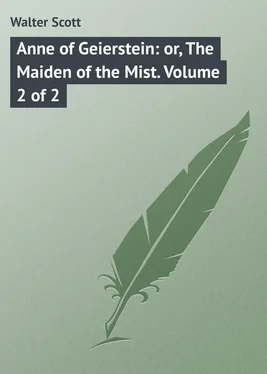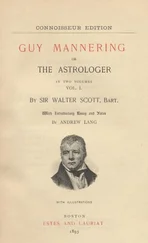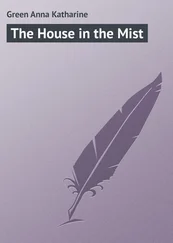Walter Scott - Anne of Geierstein - or, The Maiden of the Mist. Volume 2 of 2
Здесь есть возможность читать онлайн «Walter Scott - Anne of Geierstein - or, The Maiden of the Mist. Volume 2 of 2» — ознакомительный отрывок электронной книги совершенно бесплатно, а после прочтения отрывка купить полную версию. В некоторых случаях можно слушать аудио, скачать через торрент в формате fb2 и присутствует краткое содержание. Жанр: foreign_prose, на английском языке. Описание произведения, (предисловие) а так же отзывы посетителей доступны на портале библиотеки ЛибКат.
- Название:Anne of Geierstein: or, The Maiden of the Mist. Volume 2 of 2
- Автор:
- Жанр:
- Год:неизвестен
- ISBN:нет данных
- Рейтинг книги:4 / 5. Голосов: 1
-
Избранное:Добавить в избранное
- Отзывы:
-
Ваша оценка:
- 80
- 1
- 2
- 3
- 4
- 5
Anne of Geierstein: or, The Maiden of the Mist. Volume 2 of 2: краткое содержание, описание и аннотация
Предлагаем к чтению аннотацию, описание, краткое содержание или предисловие (зависит от того, что написал сам автор книги «Anne of Geierstein: or, The Maiden of the Mist. Volume 2 of 2»). Если вы не нашли необходимую информацию о книге — напишите в комментариях, мы постараемся отыскать её.
Anne of Geierstein: or, The Maiden of the Mist. Volume 2 of 2 — читать онлайн ознакомительный отрывок
Ниже представлен текст книги, разбитый по страницам. Система сохранения места последней прочитанной страницы, позволяет с удобством читать онлайн бесплатно книгу «Anne of Geierstein: or, The Maiden of the Mist. Volume 2 of 2», без необходимости каждый раз заново искать на чём Вы остановились. Поставьте закладку, и сможете в любой момент перейти на страницу, на которой закончили чтение.
Интервал:
Закладка:
Behind the altar, which seemed to be the central point, on which all eyes were bent, there were placed in parallel lines two benches covered with black cloth. Each was occupied by a number of persons, who seemed assembled as judges; but those who held the foremost bench were fewer, and appeared of a rank superior to those who crowded the seat most remote from the altar. The first seemed to be all men of some consequence, priests high in their order, knights, or noblemen; and notwithstanding an appearance of equality which seemed to pervade this singular institution, much more weight was laid upon their opinion, or testimonies. They were called Free Knights, Counts, or whatever title they might bear, while the inferior class of the judges were only termed Free and worthy Burghers. For it must be observed, that the Vehmique Institution, 1 1 The word Wehme, pronounced Vehme, is of uncertain derivation, but was always used to intimate this inquisitorial and secret Court. The members were termed Wissenden, or Initiated, answering to the modern phrase of Illuminati. Mr. Palgrave seems inclined to derive the word Vehme from Ehme , i. e. Law , and he is probably right.
which was the name that it commonly bore, although its power consisted in a wide system of espionage, and the tyrannical application of force which acted upon it, was yet (so rude were the ideas of enforcing public law) accounted to confer a privilege on the country in which it was received, and only freemen were allowed to experience its influence. Serfs and peasants could not have a place among the Free Judges, their assessors, or assistants; for there was in this assembly even some idea of trying the culprit by his peers.
Besides the dignitaries who occupied the benches, there were others who stood around, and seemed to guard the various entrances to the hall of judgment, or, standing behind the seats on which their superiors were ranged, looked prepared to execute their commands. These were members of the order, though not of the highest ranks. Schöppen is the name generally assigned to them, signifying officials, or sergeants of the Vehmique court, whose doom they stood sworn to enforce, through good report and bad report, against their own nearest and most beloved, as well as in cases of ordinary malefactors.
The Schöppen, or Scabini, as they were termed in Latin, had another horrible duty to perform – that, namely, of denouncing to the tribunal whatever came under their observation, that might be construed as an offence falling under its cognisance; or, in their language, a crime against the Vehme. This duty extended to the judges as well as to the assistants, and was to be discharged without respect of persons; so that, to know, and wilfully conceal, the guilt of a mother or brother, inferred, on the part of the unfaithful official, the same penalty as if he himself had committed the crime which his silence screened from punishment. Such an institution could only prevail at a time when ordinary means of justice were excluded by the hand of power, and when, in order to bring the guilty to punishment, it required all the influence and authority of such a confederacy. In no other country than one exposed to every species of feudal tyranny, and deprived of every ordinary mode of obtaining justice or redress, could such a system have taken root and flourished.
We must now return to the brave Englishman, who, though feeling all the danger he encountered from so tremendous a tribunal, maintained nevertheless a dignified and unaltered composure.
The meeting being assembled, a coil of ropes, and a naked sword, the well-known signals and emblems of Vehmique authority, were deposited on the altar; where the sword, from its being usually straight, with a cross handle, was considered as representing the blessed emblem of Christian Redemption, and the cord as indicating the right of criminal jurisdiction, and capital punishment. Then the President of the meeting, who occupied the centre seat on the foremost bench, arose, and laying his hand on the symbols, pronounced aloud the formula expressive of the duty of the tribunal, which all the inferior judges and assistants repeated after him, in deep and hollow murmurs.
"I swear by the Holy Trinity, to aid and co-operate, without relaxation, in the things belonging to the Holy Vehme, to defend its doctrines and institutions against father and mother, brother and sister, wife and children; against fire, water, earth, and air; against all that the sun enlightens; against all that the dew moistens; against all created things of heaven and earth, or the waters under the earth; and I swear to give information to this holy judicature, of all that I know to be true, or hear repeated by credible testimony, which, by the rules of the Holy Vehme, is deserving of animadversion or punishment; and that I will not cloak, cover, or conceal, such my knowledge, neither for love, friendship, or family affection, nor for gold, silver, or precious stones; neither will I associate with such as are under the sentence of this Sacred Tribunal, by hinting to a culprit his danger, or advising him to escape, or aiding and supplying him with counsel, or means to that effect; neither will I relieve such culprit with fire, clothes, food, or shelter, though my father should require from me a cup of water in the heat of summer noon, or my brother should request to sit by my fire in the bitterest cold night of winter: And further, I vow and promise to honour this holy association, and do its behests speedily, faithfully, and firmly, in preference to those of any other tribunal whatsoever – so help me God, and His holy Evangelists."
When this oath of office had been taken, the President addressing the assembly, as men who judge in secret and punish in secret, like the Deity, desired them to say, why this "child of the cord" 2 2 The term Strick-kind , or child of the cord, was applied to the person accused before these awful assemblies.
lay before them, bound and helpless. An individual rose from the more remote bench, and in a voice which, though altered and agitated, Philipson conceived that he recognised, declared himself the accuser, as bound by his oath, of the child of the cord, or prisoner, who lay before them.
"Bring forward the prisoner," said the President, "duly secured, as is the order of our secret law; but not with such severity as may interrupt his attention to the proceedings of the tribunal, or limit his power of hearing and replying."
Six of the assistants immediately dragged forward the pallet and platform of boards on which Philipson lay, and advanced it towards the foot of the altar. This done, each unsheathed his dagger, while two of them unloosed the cords by which the merchant's hands were secured, and admonished him in a whisper, that the slightest attempt to resist or escape would be the signal to stab him dead.
"Arise!" said the President; "listen to the charge to be preferred against you, and believe you shall in us find judges equally just and inflexible."
Philipson, carefully avoiding any gesture which might indicate a desire to escape, raised his body on the lower part of the couch, and remained seated, clothed as he was in his under-vest and caleçons , or drawers, so as exactly to face the muffled President of the terrible court. Even in these agitating circumstances, the mind of the undaunted Englishman remained unshaken, and his eyelid did not quiver, nor his heart beat quicker, though he seemed, according to the expression of Scripture, to be a pilgrim in the Valley of the Shadow of Death, beset by numerous snares, and encompassed by total darkness, where light was most necessary for safety.
The President demanded his name, country, and occupation.
"John Philipson," was the reply; "by birth an Englishman, by profession a merchant."
Читать дальшеИнтервал:
Закладка:
Похожие книги на «Anne of Geierstein: or, The Maiden of the Mist. Volume 2 of 2»
Представляем Вашему вниманию похожие книги на «Anne of Geierstein: or, The Maiden of the Mist. Volume 2 of 2» списком для выбора. Мы отобрали схожую по названию и смыслу литературу в надежде предоставить читателям больше вариантов отыскать новые, интересные, ещё непрочитанные произведения.
Обсуждение, отзывы о книге «Anne of Geierstein: or, The Maiden of the Mist. Volume 2 of 2» и просто собственные мнения читателей. Оставьте ваши комментарии, напишите, что Вы думаете о произведении, его смысле или главных героях. Укажите что конкретно понравилось, а что нет, и почему Вы так считаете.












